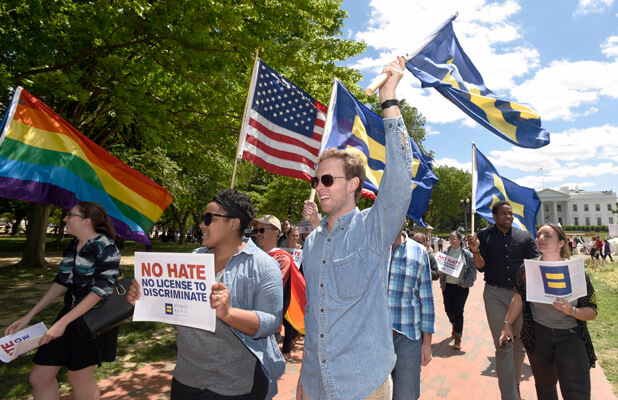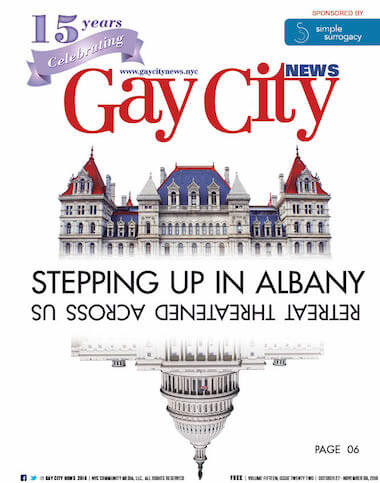The seven-member Nebraska Supreme Court has unanimously affirmed a lower court decision that the state’s 1995 published policy banning adoptions and foster placements into any household with a “homosexual” in residence was unconstitutional. The ruling also nixed an informal policy adopted more recently by the state’s Department of Health and Human Services under which “exceptions” could be made in particular cases.
The high court’s April 7 ruling, upholding a ruling by Lancaster County District Judge John A. Colborn, came in a case brought by the American Civil Liberties Union on behalf of same-sex couples who sought to foster or adopt children but were either discouraged by Department staff members or deterred by the formal policy posted on the Department’s website. The Supreme Court focused mainly on technical issues, as the state apparently conceded there was no good reason to single out gay and lesbian adults for discriminatory treatment and sought to persuade the court that the case was “moot” and should be dismissed, preferably without awarding costs and fees to the plaintiffs.
The trial judge awarded costs and fees totaling about $175,000, an amount that will increase if costs and fees are later awarded to the plaintiffs for successfully defending their victory in the State Supreme Court.
Unanimous bench sets aside nonsensical arguments over what was policy, what was practice
The lengthy opinion by Justice John F. Wright is devoted almost entirely to refuting ridiculous arguments mounted by the state to try to convince the court it lacked jurisdiction to decide the case.
The formal 1995 policy at issue applied a similar placement ban on “unmarried heterosexual couples.” The memo “directed staff not to specifically ask about an individual’s sexual orientation or marital status beyond those inquiries already included in the licensing application and home study,” according to Wright’s opinion. “The stated reason for the policy was this State’s intent to place children in the most ‘family-like setting’ when out-of-home care is necessary.”
The memo contemplated that a formal regulation incorporating its policies would be adopted, but that did not happen. In fact, there is no formal statutory or regulatory ban on gay people being foster or adoptive parents in Nebraska, as such. The entire focus of the lawsuit and the court opinions was on the “policy” expressed in the 1995 memo and subsequent “practices” adopted by the Department’s directors. The memo remained on the Department’s website as a formal policy statement until after this lawsuit began. It was used in training staff members and was referred to specifically by staff members when they discouraged one of the plaintiff couples from formally applying to get a foster child, a prerequisite in Nebraska to legal adoption.
Part of the state’s defense was that even though the memo remained on the Department’s website, it was no longer actual policy since lesbian and gay applicants had been accepted. This informal policy, however, was not well publicized throughout the department, there were no formal instructions to staff about it, and no mechanism was created to appeal denials based on an applicant’s sexual orientation.
Under this informal practice in place in recent years, gay applicants approved at the first level required four additional sign-offs, including from the Department’s director –– hurdles imposed on no other placements, including to unmarried heterosexual parents or to former prison inmates.
One of the state’s least credible arguments was that the plaintiffs did not have standing to bring the lawsuit because none of the couples had formally applied and been turned down. This was a nonsense, since it was clear that any gay couple applying had to be rejected under the formal policy posted on the website and taught to staff members. When pressed about why the 1995 remained for so long on the Department’s website despite officials’ insistence that it was no longer its “practice,” they intimated they wanted to prevent the possibility that a formal withdrawal of the memo would provoke the State Legislature to pass an explicit ban on “homosexuals” serving as foster or adoptive parents.
The defense witnesses struggled to define the difference between a “policy” and a “practice,” and argued that because the complaint explicitly challenged only the 1995 memo, the court should not decide the constitutionality of the informal “practice” –– though since it was informal the plaintiffs could hardly have known of its existence. Rejecting the state’s formalistic arguments, the Supreme Court agreed with Judge Colborn that the informal practice was itself discriminatory.
The defense witnesses advanced no good reason why approving gay parents involved five levels of approval under the informal practice, and, in fact, the opinion makes no mention of evidence that any gay foster or adoptive parents have been approved.
Citing numerous US Supreme Court precedents, the Nebraska high court found that even though none of the plaintiffs had been formally denied, clear evidence of the denial of equal treatment as a result of the published policy and the unpublished practice was sufficient to prove injury.
“If a discriminatory policy is openly declared,” wrote Wright, “then it is unnecessary for a plaintiff to demonstrate it is followed in order to obtain injunctive or declaratory relief. We thus find immaterial any dispute in the record” about whether it was the policy or the practice that was in effect and what the meaning of the 1995 memo’s withdrawal from the Department’s website was. “A secret change in policy or procedure cannot moot an action based on a published policy statement that has been cited by the agency as excluding the plaintiffs from eligibility.”
In the final section of his opinion, Wright intimated what the state’s appeal was really all about. Nebraska was not actually contesting Judge Colborn’s conclusion that the policy or practice is unconstitutional. Rather, it doesn’t want to pay court costs and attorneys’ fees to the plaintiffs! The state’s lawyers argued that Colborn abused his discretion in awarding costs and fees and should have declared the case moot and dismissed once the state removed the 1995 memo from its website. The district court, in late 2015, had awarded the plaintiffs $28,849.25 in costs and $145,111.30 in attorneys’ fees.
Lead attorneys for the plaintiffs are Amy Miller of the ACLU of Nebraska, Leslie Cooper of ACLU’s national LGBT & HIV Project, and cooperating attorneys Garrard R. Beeney and W. Rudolph Kleysteuber of Sullivan & Cromwell LLP. Amicus briefs in support of plaintiffs were filed by the Nebraska Appleseed Center for Law in the Public Interest and the Child Welfare League of America.


































